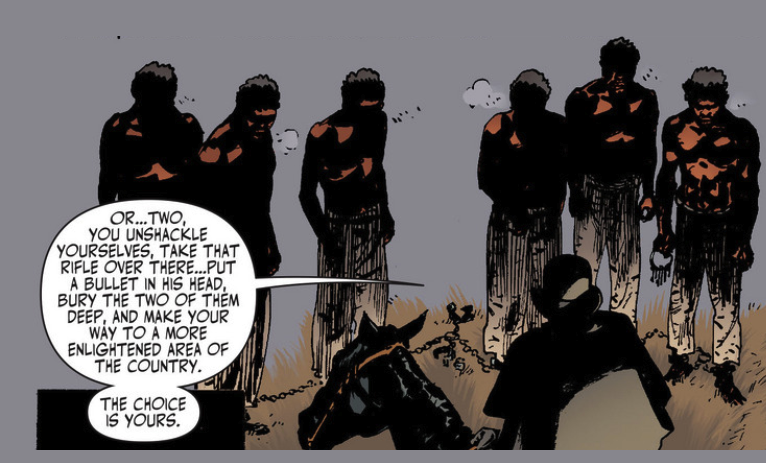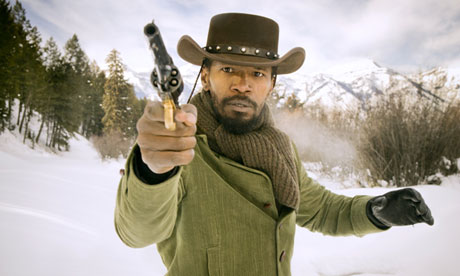The entire Django Unchained roundtable is here.
_____________
Antebellum fugitive slaves were criminals according to the laws of their day. Their labor, their bodies, and any future that they might imagine belonged to the estates of the people who held the bill of sale. And so when enslaved black men and women wrote the stories of their escape in order to advocate for abolition, they took special care in persuading readers not only that the laws they had broken were unjust, but also that they had the moral strength to manage the freedom they had “stolen.” This is why when a Maryland slave named Josiah Henson, having been deceived by the master who vowed to manumit him, raised an axe above the head of his owner’s sleeping son, Henson stopped short of landing the fatal blow. In The Life of Josiah Henson, Formerly a Slave, Now an Inhabitant of Canada (1849), he explains:
It was self-defence, — it was preventing others from murdering me, — it was justifiable, it was even praiseworthy. But now, all at once, the truth burst upon me that it was a crime. […] I was about to lose the fruit of all my efforts at self-improvement, the character I had acquired, and the peace of mind which had never deserted me. […] I shrunk back, laid down the axe, crept up on deck again, and thanked God, as I have done every day since, that I had not committed murder. (42-43)
Scenes such as this constitute a fairly common trope in the slave narrative genre, one that literary critic Raymond Hedin described as the slave on the road. These moments, however accurately conveyed, were deployed in abolitionist narratives to refute the notion that without constant supervision, black people would succumb to so-called baser instincts that could turn “a pleasant-tempered fellow, into a savage, morose, dangerous slave” (Henson 41). Fugitive slaves responded by calling attention to the times in which they were out of the watchful eyes of their masters, or in a situation in which a white person was particularly vulnerable – in these instances, the enslaved would demonstrate their self-control and virtuous character by adhering to a higher standard of behavior. Henson, the man whom Harriet Beecher Stowe once tried to credit as one of the inspirations for Uncle Tom’s Cabin, presented himself as a man who held to an especially strict moral code. Nevertheless, it is unlikely that Henson would have been able to free himself or his family if he hadn’t eventually broken the law.
I thought about Josiah Henson when I watched the opening scene of Quentin Tarantino’s film, Django Unchained. The white bounty hunter, Dr. King Schultz, has forcibly purchased (rescued?) Django after a shoot out with the Speck brothers, the two slave traders transporting him. With one of the brothers killed and another trapped under his horse, Schultz turns to the small group of enslaved black men that had been chained to Django just minutes before and tosses them the keys to their leg irons:
SCHULTZ: “So as I see it, when it comes to the subject of what to do next, you gentlemen have two choices. One, once I’m gone, you lift that beast off the remaining Speck, then carry him to the nearest town. Which would be at least thirty-seven miles back the way you came. Or…two, you unshackle yourselves, take that rifle over there…put a bullet in his head, bury the two of them deep, and make your way to a more enlightened area of the country. The choice is yours.”
Hearing this, the slave trader under the horse curses the approaching group of newly freed men and then begs for his life as they stand over him in silence. When the rifle shot sounds, a sudden spray of blood and flesh explodes from his head and the scene ends.
“The choice is yours.” With the bounty hunter’s words, Tarantino’s film enters into a larger conversation about race, representation, and the negotiations of moral responsibility that has as much to do with affirming Henson’s decision to set aside his axe as it does with celebrating a kind of vengeful catharsis that is without consequence. The film reminds us that in the slave’s narrative, honor was also a bounty to be hunted; the accounts of Frederick Douglass, Harriet Jacobs, Henry Bibb, and others were strategic and deliberative “fictions of factual representation,” as scholar William Andrews put it, even if they were not as brutally self-serving as Django.
In other words, Django Unchained may be a Blaxploitation Western film (by way of Oscar Michaeux as Brian persuasively argues), but it is also reimagines the slave on the road narrative in a way that favors a highly individualistic sense of honor and responsiveness over collective survival. “Each man to his own Canada,” to quote Raven Quickskill, Ishamel Reed’s fugitive slave-poet. I actually found the postmodern satire in Django Unchained to be as satisfyingly irreverent as Reed’s novels, yet Schultz’s “two choices” – made explicit here and implied repeatedly throughout the film – pose a more interesting question for me about exactly what need Tarantino’s revenge fantasy is meant to satisfy.
(Of this opening scene, it is worth noting that Vertigo’s comic book adaptation of Django Unchained does not end in the same fashion. It closes with the group of black men in deliberation, unlocked chains at their feet, while the Speck brother’s wide blue eyes await their decision. Much of the film’s bloodshed is minimized in the first issue of the serial that is based on Tarantino’s original screenplay with art by R.M. Guéra and Jason Latour. Whether or not the rest of the story will take the same visual risks as a comic like Kyle Baker’s Nat Turner remains to be seen.)
But we can only go so far with an apples-to-apples comparison of Django and Nat Turner, or Josiah Henson for that matter. Django expresses qualms during his work with Schultz about killing a man in front of his child, while in a different context he maintains his grim disguise when one of Calvin Candie’s “Mandingo” fighters is torn apart by dogs. In the early scenes if Django appears to act recklessly or in anger, his white partner’s arrest warrants are there to protect him from the repercussions of these emotions. Still Django never forgets that he is on the road – or that his humanity is commodified by the color of his skin – and in return for his resolve, he and Broomhilda live to see her master’s house burn to the ground. Of course, it may sound too good to be true (and one of the more useful reviews of the film assures us that it is) and what happens after the credits roll is unclear to say the least. But as with the cultural analysis of texts like William Styron’s The Confessions of Nat Turner or Alice Walker’s The Color Purple, I am curious about what Django’s choices reveal about us and the moment in which we live.
I wonder, for instance, what to make of the fact that this controversial, and now Oscar-nominated, blockbuster film comes at the close of President Obama’s first term in office. Once praised for his even-tempered composure and open-mindedness, Barack Obama’s cool disposition has been relentlessly scrutinized for the past four years, notably during his intense presidential campaign in 2008, in the aftermath of the BP oil spill (“One time, go off!” pleaded Spike Lee), and more recently during his debates with Mitt Romney in 2012. Progressives cringe as members of Congress and the press pool cut him off or when an attention-seeking politician jabs a finger in his face – “Have you thought about getting angrier?” Keith Olbermann once asked. But as Ta-Nehisi Coates astutely notes,
…Politicized rage has marked the opposition to Obama. But the rules of our racial politics require that Obama never respond in like fashion. So frightening is the prospect of black rage given voice and power that when Obama was a freshman senator, he was asked, on national television, to denounce the rage of Harry Belafonte. This fear continued with demands that he keep his distance from Louis Farrakhan and culminated with Reverend Wright and a presidency that must never betray any sign of rage toward its white opposition. Thus the myth of “twice as good” that makes Barack Obama possible also smothers him. It holds that African Americans—enslaved, tortured, raped, discriminated against, and subjected to the most lethal homegrown terrorist movement in American history—feel no anger toward their tormentors.
Every insult and public outrage is now accompanied by pleas for President Obama to get angrier, drop the Spock routine and act on his emotion; in other words, to make a different choice. Not to overstate the similarities (and I’m sure I’m not the only one to make this connection), but Tarantino’s film seems crafted to elicit the same urge from his audience as Django’s makes his labyrinthine journey into “Candieland.” When Broomhilda’s bill of sale has been transferred and Django stands at the brink of a precarious future that, however fragile, is his own – it is the bounty hunter who decides what comes next. Schultz, after repeatedly advising caution to keep Django in control, is the one who ultimately determines that the collective cost of allowing the slave master to live is too high. Authorized, then, by this impetuous act and driven by the fear of losing his wife, Django steps onto the road and becomes the “dangerous slave” whose Canada is a plantation house splattered with blood.
I enjoyed the film. Though as I watched, I must admit that I found myself wishing that Django had been the one to confront Candie first. None of the carnage that follows means much without his agency in that moment. The fact that he doesn’t pull the trigger says a lot, I think, about the choices that continue to guide our understanding of race, power, and moral responsibility on the road today.


